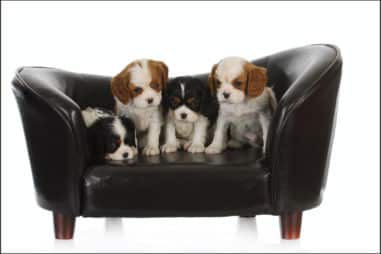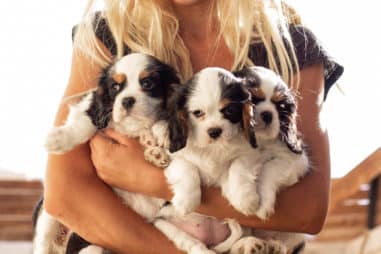Cavaliers are generally unproblematic, especially when they are well-trained. They are friendly, gentle, and docile, which makes them perfect companions for many.
But they can be very dependent on you. Compared to other dogs, they are more prone to separation anxiety. This brings out unwanted behaviors that can result in self-injury.
This is why Cavaliers may not be for everyone. But if they fit your lifestyle and if you can provide for their needs, they are such a delight to have. They are happy to shower you with lots of love and cuddles in return!
Are Cavalier King Charles Spaniels Aggressive?
Cavaliers are not known to be aggressive dogs. Instead, they are friendly and affectionate breeds. This is what makes them great companions for almost everyone.
Can Cavalier King Charles Spaniels Be Aggressive?
Like other dog breeds, Cavaliers can be aggressive. Given that this is unusual for this sweet breed, aggression may mean that something is wrong. So if your Cavalier shows any signs of hostility, you should take action right away.
But before you can address the issue, you need to know what is causing this. Below is a list of common reasons for their aggression.
Fear Aggression
When a dog feels threatened, its natural response is to become aggressive. Your Cavalier does this, too, to protect itself. Sometimes, they may even do this to defend you or their puppies when there is a threat.
Resource Guarding
Their protective instincts may extend towards their stuff too. Your Cavalier may feel territorial over their food, toys, and bed. So when you or another dog go near these, they can be quick to aggression.
Cage Rage
If you keep your Cavalier in their cage for too long, naturally, they will not feel happy. Cavaliers are outgoing and enjoy having fun in your company. So if you forget about them in their cage, you will make them angry.
Dominance Aggression
When your Cavalier wants to be the big boss in the house, they will fight other dogs and even you. This is more common in male Cavaliers, who are more dominant. But female Cavaliers may also experience this.
Frustration
When you want to do something but you cannot, you get frustrated. The same thing happens with your Cavalier. They may want to go out and play with the dog passing by, but since they could not, they will throw a fit.
Pain
When your Cavalier is not feeling their best, they may not want your company. If you go near them, they may bark at you to keep you away.
Health Issues
Many health problems, like tumors, can make your Cavalier hostile. So before addressing their aggression, you need to take them to the vet to rule out this possibility. You cannot correct this with training if medical intervention is what they need.
Are Cavalier King Charles Spaniels Dangerous?
If you want a pet who is good with people, Cavaliers are one of the friendliest dog breeds out there. They are friendly with strangers, other animals, and even little kids. This is why they are also a great option as family pets.
Do Cavalier King Charles Spaniel Bite?
It is normal for Cavalier puppies to be nippy. At a young age, they are still learning bite inhibition through play biting. But as they grow into adults, they should not bite anymore.
Well-trained and healthy Cavaliers do not bite. So when they do, there is an issue that you need to resolve. The common reasons why a Cavalier may bite are the following:
Behavioral Issues
Your Cavalier may bite to ask for attention, when scared or when excited. They may also use this to tell you that they do not want to do something you are making them do.
But why do they use an odd form of communication?
They may have learned that biting gets your attention. You may have done this when they were puppies so this is a habit that is hard for them to shake off.
Fear or Anxiety
Part of fear-motivated aggression is biting so they can protect themselves. When they feel backed into a corner, your otherwise sweet Cavalier will not hesitate to use force.
This is why socialization is an important part of their puppyhood. Through socialization, they will learn that many, everyday things are not as scary as it seems. This will prevent them from getting scared, especially when outdoors.
Pain
Cavaliers who are in pain are likely to bite. When you handle them, they fear that you may touch the area that hurts. If they do this, take this as a sign to back off.
Are Cavalier King Charles Spaniels Chewers?
If dogs who are chewers are not your thing, Cavaliers are not big chewers. But they do enjoy it as it is pleasurable and fun for them. Even if they do not make it to the top chewer-breeds list, you should still give them some toys to munch on.
Are Cavalier King Charles Spaniels Destructive?
Fortunately, Cavaliers are not known to be destructive dogs. But they are prone to separation anxiety, a common cause of destructive behaviors. This is a significant issue with Cavaliers as they can be very attached to their owners.
If your Cavalier suffers from this, they may wreck a lot of stuff. They may chew on your furniture, scratch floors, and more. These are all odd attempts to soothe their restlessness in your absence.
While doing these, Cavaliers may hurt themselves. They may damage their nails, get cuts, and break their teeth, to name a few. So not only do they damage items, but they may also injure themselves.
Do Cavalier King Charles Spaniels Drool?
All dog breeds drool to some extent, but Cavaliers do not do this as much. They may drool during mealtime, when excited or stressed, or when they are in heat. These are all normal situations for your Cavalier to drool.
But there are situations when their drooling is something to worry about. This can be a sign that your Cavalier has the following:
- Poisoning
- Oral Problems
- Fever
- Rabies
- Difficulty Swallowing
- Stomach Issues
If you suspect that any of these is causing your Cavalier to drool more than normal, take them to the vet. In cases like these, they will need medical intervention.
Do Cavalier King Charles Spaniels Dig?
Digging is natural for dogs to do and many love it, including your Cavalier. But they do not tend to dig more than other breeds. Although if they suffer from separation anxiety, this can be one of the ways it manifests.
With separation anxiety, your Cavalier will dig into anything they can be it the floor, doors, and more. And if they have access to your garden, you will have many holes in it.
Are Cavalier King Charles Spaniels Noisy or Quiet?
As a dog of few words, Cavaliers are generally quiet, rarely barking. They prefer communicating with you with their body language. Instead of barking, they may wiggle their body when asking for treats.
But when they do bark, it could mean a lot of things. This is uncharacteristic for the docile Cavalier. So it is up to you to figure out why they are barking more than usual.
To help you with this, here are common reasons why Cavaliers bark.
Separation Anxiety
Excessive barking is usually because of separation anxiety. This is their way of dealing with the stress of not having you around with them. You can even say that this is how they cry at the thought of you being away from home.
As mentioned, your Cavalier is prone to developing this. So when they are noisier than usual, this is one of the first things you should consider.
Fear of Strangers
Does your Cavalier bark at the sight of strangers and unfamiliar dogs? This means that your Cavalier does not know how to interact with them. So they bark instead.
This occurs when your Cavalier lacked proper socialization from a young age. Socialization helps them to get used to new things. Be it experiences, places, sounds, smells, and even new faces. With this, they will know how to act in these situations.
Without this, you will have a fearful Cavalier. This manifests in many ways, and barking is one of them.
But keep in mind, a scared Cavalier can become aggressive too. So make sure to socialize them as puppies.
It is normal for Cavaliers to bark when they hear a doorbell, a typical dog behavior.
Territorial Issues
Your cavalier perceives their space, food, toys, and even you as their territory. When there is a threat to take these away, they will bark. So make sure always give them a sense of security with their items.
If you have children, make sure that they do not take your Cavalier’s toys. This can even happen when your Cavalier is playing with their toy and a kid goes near them. They will bark at the child to tell them to back off.
Alerting You of Danger
When your Cavalier senses danger, they will bark to let you know. But since they are small and overly friendly, you cannot expect them to be good guard dogs.
Boredom
The lack of mental and physical stimulation can manifest in various ways. For your Cavalier, they may bark to their heart’s content. This is one way they entertain themselves, as barking can be fun for them.
Hunger
If food is not ready by the time it should be, your Cavalier will let you know. Sometimes, they may just be hungry so they are asking you for extra food.
But be careful not to give in to their barks too much. Your smart Cavalier will learn that barking gives them food. So they will end up begging whenever they want treats.
Pain
Cavaliers who have health issues or injuries are in pain. With this, they want to be alone. They will bark when you go near them in fear that you will touch the painful area.
Are Cavalier King Charles Spaniels Vocal?
The easy-going Cavaliers are not known to be vocal breeds. But they do bark sometimes, like when they get excited during playtime. Of course, there are exceptions to this as certain issues can make them vocal.
Separation anxiety is the common reason why Cavaliers suddenly become more vocal. They will bark, whine, and cry whenever you are about to leave or when you are not around. This is something that your neighbors will not appreciate.
Are Cavalier King Charles Spaniels Yappy?
Small dogs are notorious for being yappy, but not Cavaliers. Keep in mind though that dogs of this breed have different personalities. Some may be silent, while others may be rowdier than others.
If your Cavalier is the latter, do not worry. They are a smart breed that responds well to training. You can discourage this behavior with positive reinforcement.
Do Cavalier King Charles Spaniels Bark a Lot?
Cavaliers often bark only when needed, like when someone is at your door. Their quiet nature is what makes them great apartment dogs for many people.
But keep in mind that their barking can get out of hand too. If this is excessive, you first need to rule out the possibility of health issues. A dog who is in pain will bark more than usual.
If that is not the case for your Cavalier, you can correct this. Fear and resource guarding are two common causes of this.
This is why socialization plays an important role in a puppy’s development. Cavaliers who got used to a lot of situations are more well-behaved. So, they act appropriately, deeming barking as unnecessary.
To stop your Cavalier from barking a lot, you can train them not to. They are intelligent dogs, so they will pick up on training fast.
Teach them a different form of communication, other than barking. Or discourage this behavior, especially when they are doing it to beg for food.
There are many ways to go about this, but you should only use positive reinforcement. Using any aversive methods will make them fear you. Remember, fear causes dogs to be vocal and act aggressive, the opposite of what you want to do.
What Are the Disadvantages of Cavalier King Charles Spaniel?
As charming and delightful Cavaliers are, they are not for everybody. Choosing any dog breed takes a lot of research to see if they are the right fit. So if you are considering this breed, there are some disadvantages to them that you need to consider.
Daily Brushing
Cavaliers have lustrous, medium-length coats that need regular brushing. This is an important part of their daily routine. Without it, they will easily get tangles and mats.
Not Hypoallergenic
If you love dogs but suffer from allergies, Cavaliers may not be your best option. They shed moderately all year round, spreading allergens in the air. Although you can lessen shedding with regular brushing, it may not be enough.
Regular Ear Cleaning
Their long, pendant-like ears are one of their defining features. Although they make Cavaliers cute, their ears need constant cleaning.
Because of their ear shape, air does not reach inside your Cavalier’s ears. This lack of airflow is a problem. It makes their ears moist and a great breeding ground for bacteria.
Along with wax buildup, a Cavalier’s ears often become dirty. If you do not clean them, they can get an ear infection.
Genetically Inherited Diseases
Cavaliers are not the healthiest of dog breeds as they are prone to 25 health issues. Some of which affect a significant percentage of Cavaliers.
One that is most worrying is mitral valve disease, a condition where one of the heart valves weakens. This can lead to heart failure and is the most common cause of Cavalier deaths. The prevalence of mitral valve disease is significantly higher in Cavaliers than in other dog breeds.
Other than that, here are some other health issues that Cavaliers are susceptible to:
- Syringomyelia
- Hip Dysplasia
- Intervertebral Disc Disease (IVDD)
- Patellar Luxation
Obesity
This breed eats like a king, fit for its name. But this also means that they have an increased risk of obesity.
It does not help that they are also prone to intervertebral disc disease. IVDD affects your Cavalier’s spine. And with excess weight, there is more pressure on their spine, exacerbating the issue.
Separation Anxiety
Cavaliers hate being alone as they will always want your company. This makes them a lovable breed, but this also means that they are very dependent on you. If they are alone all the time, they can develop separation anxiety.
Unfortunately, Cavaliers are prone to this disorder. This puts them in extreme distress whenever you are not around. It is also the root cause of many unwanted and destructive behaviors.
Prey Drive
As a relative of working spaniels, Cavaliers still have their hunting instincts. They will chase down smaller animals, like rats, rabbits, and guinea pigs. With this, you have two issues to worry about.
One is that you will have a hard time if you already have a smaller pet. Although Cavaliers are very friendly, their instincts may kick in. This is dangerous, so never leave your Cavalier alone with them.
Another is that they will always need a leash when walking. Any small creature they see will drive them to run and chase for it, not listening to you. Your Cavalier may end up hurting itself in the process.
Not Good as Guard or Watch Dogs
First of all, Cavaliers are a small breed that cannot do much to protect you from an intruder. They are also docile and very friendly. They may bark at intruders but will demand pets afterward.
Expensive
Cavaliers are not the most expensive dog breeds, but they are also not the cheapest. Buying a Cavalier can cost you around $1,000 to $2,500. But the cost does not end when you buy a puppy, right?
You also need to consider the cost of owning one. On the first year, you may spend about $3,000 on your Cavalier. In the following years, you may shell out about $1,000.
The first year is more expensive as you need to buy supplies, give them their first vaccines, and more. But this does not include the costs for injuries or unexpected expenses.
And as your Cavalier ages, their health begins to deteriorate. This breed is prone to many health issues, some of which are severe. So you may need to spend outside of your budget, especially when they need surgery.
With this, it is best if you have pet insurance for them. Depending on where you get one, their insurance can cost about $23 to $93 monthly.








